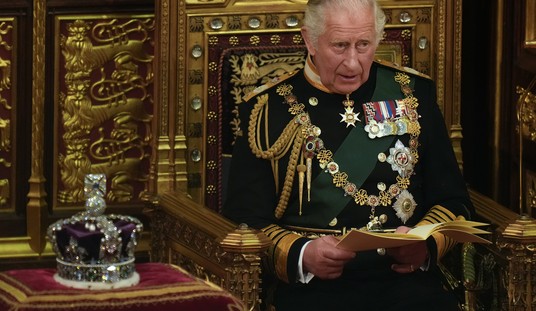Jay Carney faced a second consecutive day of sustained questioning from reporters regarding the White House’s political response to the 2012 terrorist attacks in Benghazi, Libya. Yesterday he suggested that lead inquisitor Jonathan Karl might have been too jet-lagged to formulate coherent questions. Today he smirked and chuckled through many of the questions, taking personal jabs at correspondent Ed Henry and his current employer, Fox News:
Fascinating how personal Carney gets over Ed Henry’s questioning re: Benghazi — ad hominem attacks on Fox News.
— Josh Kraushaar (@HotlineJosh) May 1, 2014
The White House spokesman’s bottom line remains unchanged: The controversial, previously-undisclosed Ben Rhodes email shaping Susan Rice’s talking points…wasn’t about Benghazi. I’ll address that notion in greater detail in a moment, but Carney also repeated the stale mantra that the administration is committed to bringing the killers to justice. Someone finally challenged him on that point at the briefing, asking why zero arrests have been made nearly 20 months removed from the attacks. The Washington Post reported in December that US officials have described such efforts as “stalled.” Meanwhile, nobody at the State Department has been held accountable, and two of the central figures in the misleading talking points phase of the scandal have received promotions. Carney’s response? Ask Osama:
Carney to those who wonder if Benghazi perpetrators will face justice: “ask the friends and family members of Osama bin Laden”
— Zeke Miller (@ZekeJMiller) May 1, 2014
The unsubtle subtext: It took years to get Bin Laden, so relax. Granted, it did take many years of painstaking work by our intelligence community to locate Bin Laden (they were aided, incidentally, by some indispensable Bush-era policies). And, yes, it took Obama’s bold order and the remarkable bravery and efficiency of our SEALs to liquidate him. The guy was holed up in a major Pakistani city — a very tightly-held secret — and he avoided the internet and phones like the plague. Some of the known Benghazi attackers, by contrast, have been freely roaming around Libya for more than a year. One of them is a former Guantanamo Bay detainee. Another is so brazen that he’s done interviews with Western media outlets. CNN last July:
The Bin Laden analogy may not be quite as clever and applicable as Carney thinks it is. In another puzzling exchange, one of the reporters asked if the White House today has a “firm grasp” of what happened that night, despite the haze of confusion Carney described in the aftermath of the attacks. Carney demurred, citing an “active investigation.” Again, it’s been 20 months. They still can’t say what exactly went down? Hmm. But let’s circle back to the administration’s primary point about the newly-unearthed Benghazi memo: That it’s, um, not a Benghazi memo. Believing this spin requires several levels of delusion. It requires the belief that senior White House officials were intimately involved in crafting Susan Rice’s talking points about everything other than the attacks that killed a sitting US Ambassador. It also requires the belief that the Rhodes email’s implicit and explicit references to Benghazi weren’t really about Benghazi. Ed Henry asked why a FOIA lawsuit specifically seeking Benghazi documents would turn up an email that was unrelated to the issue. Carney’s reply, aside from his snide digs at Fox, was essentially, “um, ask the State Department.” But these relevant pieces of evidence, to some extent, miss the forest for the trees. Rhodes’ email was sent on the evening of September 14, 2012 — three days after the deadly raid. That very same day, President Obama, Hillary Clinton and Jay Carney all linked the Benghazi attacks to the “internet video” described in Rhodes’ bullet points. Here’s Carney doing so:
“These protests were in reaction to a video that had spread to the region…we have no information to suggest that it was a pre-planned attack.”
Oh, but they did. The United States government knew with certainty that Benghazi was a choreographed act of terrorism “almost immediately.” The infamous CIA talking points, which Carney referenced ad nauseam today, never mentioned the online video angle. That fact has been affirmed by the agency’s former deputy director, under oath. A contemporaneous news report suggested that CIA analysts were “seething with anger” that the video had been invoked within the context of Benghazi. The State Department’s second-in-command on the ground that night described the online clip as a “non event” in Libya. Yet officials at the very highest levels of the administration injected that narrative into their public statements, and continued to do so for weeks. Carney is currently trying to parse this issue to death, offering convoluted explanations as to why the Rhodes email wasn’t technically an instance of the White House influencing Rice’s Benghazi talking points. He’s wrong about that, but it’s almost a moot point. Tying the video to Benghazi was a bona fide White House talking point days before Susan Rice appeared on those Sunday talk shows. Again, that baseless linkage didn’t come from the CIA. So where did it come from (if not the White House), and why was it reiterated long after the terrorism angle had been confirmed? Carney will be the first to tell you that merely asking these questions makes one party to “politicized” Republican “conspiracy theories.”








Join the conversation as a VIP Member